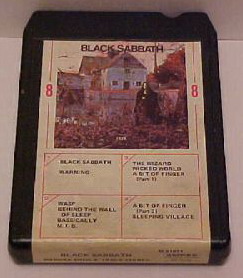
The seed for hardcore punk was planted when the DIY ethos of punk rock finally made its way to American hard rock dudes who didn’t have the gumption to properly learn the riffs of Jimmy Page and Ritchie Blackmore, who had neither the chops to sing like Bon Scott nor the lush mane of Robert Plant, who couldn’t execute a paradiddle while fully baked.
It’s safe to say the DIY ethos was a boon to countless young musicians who didn’t come close to having what it took to make it “in the round,” playing to 16,000 stoned believers in The Power & Glory of Rock. However, what initially worked like a charm to revitalize the power-packed fun and ferocity of pre-hippie rock ‘n roll and early-70s Glam rock was an uphill battle when applied to hard rock.
Punk’s influence on hard rock started out promising, with oversea reports of the New Wave of British Heavy Metal (NWOBHM). One of my burnout friends in high school, Tim, was as hungry for a rebirth of the heavy metal and hard rock he so dearly loved as I was for the Beat music that was falling further in the rearview mirror with each new, sagging release by The Who, The Kinks, the Stones, and the solo Beatles. At lunch, Tim and I would trade tales of our respective strangely familiar discoveries: Elvis Costello & the Attractions for Judas Priest, Saxon for The Clash, Buzzcocks for Def Leppard, Girlschool for The Undertones… Tim could cite, chapter and verse, passages from his imported NWOBHM magazines as readily as I could my treasured issues of Trouser Press.
For better and for worse, I would follow my love for punk and New Wave music to the point of starting a band. Tim, on the other hand, had the good sense to leave it to the pros. Despite the NWOBHM company line of favoring volume, speed, and working class values over musicianship, the bands Tim would play me could play circles around punk musicians. There were triplets galore; well-executed paradiddles; and the requisite menacing, macho, high-pitched vocals. In terms of chops and larger-than-life performance skills, the bar was still set high.
Tim’s younger brother, like hundreds of other early ’80s metalheads, would not show such reverance for their forefathers’ technical expertise. They would not be content to occasionally redirect their budget for a dime bag of dirtweed for a newly released import album by Samson. This younger generation of metalheads would see a direct link between the NWOBHM and punk rock and bash down the doors to the empire with a brand of American punk music that would be known as hardcore.
Stripped of all but basement-wanker chops, anything approaching arrangement and production values, and hard rock’s jocko-homo glamour, hardcore bands would sink or swim on their ability to convey humorous teenage barbs through barbed-wire riffs and the stripped down jocko-homo appeal of its close-cropped singers. Sweaty masses of dudes would rally behind this DIY garage-metal. This was no longer my buddy Tim’s long-promised revival of metal’s glory. Collective memories of aborted attempts at learning the unaccompanied guitar solo that linked “Heartbreaker” to “Living Loving Maid (She’s Just a Woman)” were long forgotten. Hardcore punks found their own way to rise above the stagnation of the music they grew up loving.
As one who never cared for much hardcore, I always found it funny when bands like Black Flag and Circle Jerks were accused of “selling out” and “betraying” the movement when they slowed things down, located a backbeat, and started making records that sounded like Black Sabbath and BTO. As one who at least could enjoy those ’70s sludge bands, I was all for albums like My War and Wonderful. I’ll never forget watching Wonderful-era Circle Jerks minus singer Keith Morris, who was doing a radio interview, run through a wholly instrumental soundcheck at Trenton, NJ’s City Gardens. With demonic grins, the musicians were playing sludgy prog-metal that could have served as the backing tracks for outtakes from Led Zeppelin’s Presence. It was a sight and sound that I wish Tim could have seen. Maybe it was a way the band blew off steam while Morris was out of sight, but it seemed to me that a hardcore band was finally achieving what its band members probably had in mind when they got a notion to play music in the first place.


I’m right there with you on My War, though not on Wonderful. To my ears, though, both Black Flag and Circle Jerks’ earlier records were much better. I am, however, a passionate defender of the last pre-reunion Jerks album VI, which isn’t quite as hard-rock influenced as its predecessor. And I also enjoy Black Flag’s Slip It In, though not their last 2 albums. In general, though I agree with you regarding metal’s influence on hardcore, but you forgot to mention the “crossover” movement of the mid ’80s when bands like DRI and COC that started out playing thrashy hardcore went speed metal.
Good points, Matt, and surely you know a lot more about these genres than I do.
Nice to see you posting here AND trying your hand at the formatting options. New toys, boys and girls, new toys…